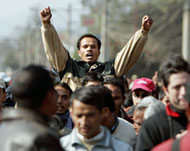Maoists kill 20 in Nepal offensive
Seventeen policemen and three army personnel were killed in bloody overnight clashes with Maoist rebels in western Nepal.

“After the fighting finished, we found the bodies of three army personnel and 17 police officers,” a senior army official said on Wednesday.
The battle came on the eve of the one-year anniversary of King Gyanendra’s takeover of complete power last February.
About 1000 rebel Maoists attacked at least five targets in the district but were repelled by the army, the official said on condition of anonymity.
No bodies of Maoist rebels had been recovered; but the army was still searching the area, 400km west of Kathmandu.
“In view of the night-long fight, we believe that there could be heavy losses on the Maoist side,” the army official said.
“After the fighting finished, we found the bodies of three army personnel and 17 police officers” |
The rebel attacks began near midnight on Tuesday and lasted until dawn on Wednesday, he said.
Rebel threat
The attacks followed threats by the rebels to disrupt planned municipal elections scheduled for 8 February.
However, King Gyanendra maintained on Wednesday that the elections would go ahead in all 58 cities and towns across the Himalayan kingdom.
He also announced that parliamentary elections would be held within the next 15 months and that terrorism had actually been reduced during his reign.
In a televised address on the first anniversary of his seizure of power from political parties, Gyanendra said: “Free and fair elections will be conducted. The elections are the only means to guarantee people’s rights (and) consolidate democracy.”
Campaign safety
 |
|
Protests against King Gyanendra |
Opposition parties are boycotting the polls, calling them a sham, and anti-monarchy protests were expected to take place on Wednesday.
Campaigning for the poll officially began on Monday, but few candidates have ventured out openly after Maoist threats to “take action” against people participating in the polls.
Local media reported that Kathmandu candidates had been told to move to paramilitary headquarters for their own safety after a candidate was shot and wounded.
Referring to parliamentary elections in his speech, Gyanendra said “all the positions held by people’s representatives will be filled” by mid-April 2007.
Elections were last held in 1999 and Nepal has been without a working parliament since it was dissolved in 2002.